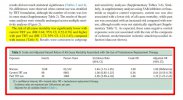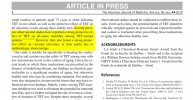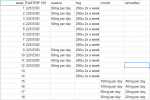No test? So you’re saying to use Sarms? The ones we know very little about when it comes to long term effects?The key to long term health success is less androgens point blank. Most anti aging experts say TRT will likely shorten your lifespan compared to someone with lower t levels. The answer is use low dose of the more tissue selective anabolics. So no dirty shit like tren or test.
Navigation
Install the app
How to install the app on iOS
Follow along with the video below to see how to install our site as a web app on your home screen.
Note: This feature may not be available in some browsers.
More options
Style variation
Guest viewing limit reached
- You have reached the maximum number of guest views allowed
- Please register below to remove this limitation
- Already a member? Click here to login
You are using an out of date browser. It may not display this or other websites correctly.
You should upgrade or use an alternative browser.
You should upgrade or use an alternative browser.
Sudden Cardiac Death in Anabolic-Androgenic Steroid Users
- Thread starter malfeasance
- Start date
malfeasance
Member
I get your point, but this is just what I grabbed in 20 seconds or less off of Google. I have read many studies with the same conclusion, and, as you note, they provide the sources so you can see for yourself.Nice link...
While I WANT to agree here, the link is not a study itself but rather a paper that is loosely a meta-study of other studies.... BUT....
The authors are citing only the studies that indicate THEIR preferred narrative (TRT good, fire bad) while not including anything which might be contra-indicative. That isn't great science.
When papers and studies reinforce my desires and preconceptions they actually need to be scrutinized even more closely.
Maybe one of these days when I am on one of my nootropic cycles I will find time to analyze all 40 of the studies they cited for potential issues
As for only the studies that agree, are you aware of a study that has as its conclusion that testosterone at 200 or lower in men has a heart protective effect or results in less cardiac events as compared to having testosterone within the reference range?
I ask because I am not aware of any, but you claimed they "are citing only the studies" with which they already agree, presumably to snow us with misinformation. Are you aware of a study that disagrees, that is, that claims the opposite, that testosterone at 200 or lower in men has a heart protective effect or results in less cardiac events as compared to having testosterone within the reference range?
malfeasance
Member
Same thing with transgender as opposed to just wanting to be a healthy male (a real one, born that way).Nicely summed up. That attitude that "aging" is fine (but only in men!) is so damn common with these studies.
Toxic masculinity is an epidemic, don't you know?
malfeasance
Member
[OA] Cardiovascular and Cerebrovascular Safety of Testosterone Therapy
To the Editor:
We read with great interest the study by Loo et al1 concerning testosterone (T) therapy increasing the risk of cerebral and cardiovascular disease. Cardiovascular and Cerebrovascular Safety of Testosterone Replacement Therapy Among Aging Men with Low Testosterone Levels: A Cohort Study - ScienceDirect
Unfortunately, the authors’ conclusions are not supported by the results, raising serious concerns. Here we highlight some of these concerns:
1. The single most important finding of this study is that almost twice as many men in the untreated group DIED vs the treatment group, in agreement with previous studies. If we were to counsel a symptomatic hypogonadal patient based on this study and the results of the T trials, we would advise him that T therapy will improve sexual function, walking distance, mood, bone mineral density, anemia, lean muscle mass, insulin sensitivity, and significantly increase his chances of being alive in 5-10 years’ time.
A major critical confounder, inadequately recognized by authors, is that T deficiency itself is a risk for increased cardiovascular events. For this reason, some investigators have elected to censor major adverse cardiovascular events during the first 12 months because those events may be related to the underlying condition rather than T treatment. Failing to take measures like this may account for differences in results between studies. Considerable published data contradict the findings of this study.
2. A careful look at the crude hazard ratios reported in Tables 2-4 suggests that there were no significant statistical differences between the treated and nontreated groups, except in Table 4, where all-cause mortality was significantly reduced in the treated group when compared with both the nontreated group and the “past use” group. The absence of statistically significant results was surprising, because the sample sizes are quite large.
Examining the forest plot, it is clear that there is a lot of variability in the estimates, and even with the large sample size, the authors did not claim any significant differences and most importantly, if these differences are clinically important. There appears to be a lack of evidence of probable clinical significance.
3. It is disturbing that the authors had a preconceived view that only men with classical hypogonadism should be treated, yet they present no evidence as to how results from a “classical” cohort would have been different from those men with nonclassical hypogonadism. On the contrary, the benefits from the T trial were seen in men with “functional” hypogonadism.
4. The authors dismissed symptoms of hypogonadism as due to “aging” and suggested that these symptoms should be tolerated, even for men in their 50s. If this were the case, then hypertension, cataracts, retinal degeneration, and hearing loss should be left untreated and accepted as a consequence of aging.
In addition, the inclusion of a comparative cohort taking 5α-reductase inhibitors is completely irrelevant and bears no basis for comparison. The authors appeared to have preconceived views and seem determined to ensure that their findings are interpreted to fit these views.
Traish AM, Hackett G, Miner M, Morgentaler A. Cardiovascular and Cerebrovascular Safety of Testosterone Therapy. Am J Med 2019. https://www.amjmed.com/article/S0002-9343(19)30433-4/fulltext
WOW
Not sure what else to say
"Science" is supposed to be non-biased . . . but it seems we get the opposite in almost every field today.
Real question is being on trt and living an active lifestyle better than being natural and not being active?
Are you aware of a study that disagrees, that is, that claims the opposite, that testosterone at 200 or lower in men has a heart protective effect or results in less cardiac
I believe this is the subject of several castrati studies. Have to see if I can dig any up.
My personal read is that the preponderance of the evidence strongly suggest that being low on Test is much worse for quantitative and qualitive life outcomes in older males.
It is just difficult to prove conclusively with any ethical study.
Real question is being on trt and living an active lifestyle better than being natural and not being active?
According to most female GP's men should simply enjoy aging normally, try not to suck up any of the valuable health care reserved for women (aside from an ambulance to cart your corpse away at the end), and make sure their wills are updated to ensure females and the State are properly provisioned with the end results of your life's earnings.
In 2017 1 and 4 men died of heart disease look it up.Evidence?
No you slow down, you posted a bullshit study that I called out. It clearly leaves out multiple variables, and has zero comparison to general population data. Not saying AAS use cant and does not cause numerous health issues, but the main reason is elevated body weight, 0f course there are unique situations, which people love to dwell on and point at and use as examples. More people die of heart attacks from poor diet then any AAS, where is that in the study? Also the study was done in Lithiania LMAO! please do some digging before you post garbage and jump on a soap box.LOL! Dude, slow down and think carefully for a little before reaching your conclusions. 1 in 4 Americans (82 million people) did not die of heart attacks! LOL!
It is one in four deaths, according to what you posted. Guess what? Heart disease is by far the leading cause of death for bodybuilders.
Pay attention, carefully consider, then post. Don't just react and post the first frivolous shit that pops into your head.
You may or may not have a valid point, but you won't know until you apply a little thought to what you are reading.
BigDaddyV
Member
In 2017 1 and 4 men died of heart disease look it up.
If one in four men die from heart disease and AAS users are mostly men, and we know AAS use can cause heart issues, how would AAS users have fewer deaths statistically? We still count as men. If we die from heart issues because of AAS use they don’t go “that one doesn’t count”. It would be counted towards that one in four. Right? Am I missing something here?AAS users statistically have far fewer deaths from heart issues then general populations.
Furthermore why’s it a problem that the study was done in Lithuania? My wifes from there, I’ve been and I’ll tell you their diets are way better than ours. So I don’t think diet would be a big factor of their heart issues.
also AAS are very easy to get there.
I’m not trying to argue so don’t take it as that.
BigDaddyV
Member
They use out houses a lot and happen to be the leading country in laser science technology. Also their medical system cured my mother in law of cancer free of charge. They’re smarter than you think. Don’t insult a whole country because people are challenging your point that’s ignorant. I understood your points for a little but now you’re losing me. People who use outhouses can’t conduct studies? OkayHere is what a toilet looks like like in Lithuania, I guess there priorities are in order when doing studies on AAS. Why not get some real plumbing and clean toilets. View attachment 138713
Our family in Lithuania has plumbing by the way. I stayed there for a year never used an outhouse
Last edited:
I would rather be big also. Nobody thats male lived past 60 in my immediate family. Whether bad decisions or health.Oops *shrug*
malfeasance
Member
Wow. I did not even notice 25% of the male population dying in 2017, much less the cause of death. I must have been busy at work and not watching the news.In 2017 1 and 4 men died of heart disease look it up.
malfeasance
Member
I have to point out that the age of living longer in that Korean castration study was 70. It is a historical look back at eunuchs and their lifespans. This is not a cohort of eunuchs in 2020.There’s a lot of studies on castrated dogs and mice about them living longer. Maybe one of the reasons why woman live longer too. Here’s one on humans:

The lifespan of Korean eunuchs
Although many studies have shown that there are trade-offs between longevity and reproduction, whether such trade-offs exist in humans has been a matt…www.sciencedirect.com
We need longer studies and basically 50 more years to see if TRT is detrimental to living a long time. We know it’s not detrimental to having a good time lol
Castration was required for court service. What this means is that impoverished starving boys could gain a life of privilege, wealth, and influence by castration.
Because of their improved living conditions, basically a step above the commoner, they could expect to live to 70.
Koreans in general could expect to kick the bucket around 50.
I am not trolling like stone988, above, but I really do not think this study has much to inform us about TRT v. living with low natty testosterone, quality of life, and longevity in 2020, even in Korea.
It also does not address cardiac events and sudden death, which is the point of this thread.
Last edited:
malfeasance
Member
I did not post any study from Lithuania. Like I said, please slow down and pay attention before firing off nonsense posts.No you slow down, you posted a bullshit study that I called out. It clearly leaves out multiple variables, and has zero comparison to general population data. Not saying AAS use cant and does not cause numerous health issues, but the main reason is elevated body weight, 0f course there are unique situations, which people love to dwell on and point at and use as examples. More people die of heart attacks from poor diet then any AAS, where is that in the study? Also the study was done in Lithiania LMAO! please do some digging before you post garbage and jump on a soap box.
Now we are not even sure on what study you are commenting, or what your point is . . .
Slow down, carefully consider what it is you are trying to say, and organize your thoughts before typing. Review them to make sure your communication is clear before hitting "Post reply." If there are personal attacks contained in your post, then reconsider whether you should post at all and whether your now reorganized and well thought out post has any basis in logic, reason, and evidence.
malfeasance
Member
I cannot believe I am responding to a person who posted a toilet picture as proof that some study (not sure what study, but some study) on cardiac events linked to steroid usage is flawed.
Aftermath9716
Member
BigDaddyV
Member
I have quite a few bodybuilders in my family. And one of them actually did have heart problems for a little but he’s okay now. My father and both his brothers were bodybuilders and are all 58-65 right now and in perfect healthI would rather be big also. Nobody thats male lived past 60 in my immediate family. Whether bad decisions or health.
This is kind of alarming..

Testosterone replacement therapy (TRT) can increase men's risk of stroke and heart attack
Aging men with low testosterone levels who take testosterone replacement therapy (TRT) are at a slightly greater risk of experiencing an ischemic stroke, transient ischemic attack (TIA), or myocardial infarction, especially during the first two years of use, reports a new study. The findings...www.sciencedaily.com
Unfortunately, the authors’ conclusions are not supported by the results, raising serious concerns. Here we highlight some of these concerns:
1. The single most important finding of this study is that almost twice as many men in the untreated group DIED vs the treatment group, in agreement with previous studies. If we were to counsel a symptomatic hypogonadal patient based on this study and the results of the T trials, we would advise him that T therapy will improve sexual function, walking distance, mood, bone mineral density, anemia, lean muscle mass, insulin sensitivity, and significantly increase his chances of being alive in 5-10 years’ time.
The fact that almost twice as many men DIED in the non-TRT group compared to TRT group is a huge finding.WOW
Not sure what else to say
"Science" is supposed to be non-biased . . . but it seems we get the opposite in almost every field today.
The researchers were aware of this finding. They briefly noted it.

And they cited 4 other studies that showed the same thing. They just worked really hard to minimize its significance.

11. Cheetham T, An J, Jacobsen SJ, et al. Association of testosterone replacement with cardiovascular outcomes among men with androgen deficiency. JAMA Intern Med 2017;177(4):491-9.
12. Sharma R, Oni OA, Gupta K, et al. Normalization of testosterone level is associated with reduced incidence of myocardial infarction and mortality in men. Eur Heart J 2015;36(40):2706-15
34. Wallis CJ, Lo K, Lee Y, et al. Survival and cardiovascular events in men treated with testosterone replacement therapy: an intention-to-treat observational cohort study. Lancet Diabetes Endocrinol 2016;4(6):498-506
47. Shores MM, Smith NL, Forsberg CW, Anawalt BD, Matsumoto AM. Testosterone treatment and mortality in men with low testosterone levels. J Clin Endocrinol Metab 2012;97(6):2050-8.
FR0Z3N_B0MB3RRR
New Member
Hope you all of you will sooner or later be free from the fear of death...
Life can be (can be.. not “It is”) about quality over quantity.. and everyone has his priorities...
Just remember that you wont suffer from death and what follows.. death means being unconscious of everything...
I fuckin hate our fuckin stupid human body... too sickly... nonetheless i would have started my journey in bb at 17 years old.. like other successful people.. i need to state this because doing it sweeten the harsh taste of remorse..
i know lot of people says Meso is a harmful reducing board dont be on gears when you re full of test... ahah i wasnt full of test.. i was a dick, so i would have started bodybuilding with peds in my 17s , right now i would be maybe a fitness celeb or maybe i would be dead .. who cares about death.. be afraid of death is a stupid instinct and when you ll defeat it you ll feel freer... good night to all guyz..
What a legend... he was a masterpiece... muuuch more beautiful than current Dyno Oympians
Life can be (can be.. not “It is”) about quality over quantity.. and everyone has his priorities...
Just remember that you wont suffer from death and what follows.. death means being unconscious of everything...
I fuckin hate our fuckin stupid human body... too sickly... nonetheless i would have started my journey in bb at 17 years old.. like other successful people.. i need to state this because doing it sweeten the harsh taste of remorse..
i know lot of people says Meso is a harmful reducing board dont be on gears when you re full of test... ahah i wasnt full of test.. i was a dick, so i would have started bodybuilding with peds in my 17s , right now i would be maybe a fitness celeb or maybe i would be dead .. who cares about death.. be afraid of death is a stupid instinct and when you ll defeat it you ll feel freer... good night to all guyz..
What a legend... he was a masterpiece... muuuch more beautiful than current Dyno Oympians
Similar threads
- Replies
- 64
- Views
- 3K
- Replies
- 10
- Views
- 864
- Replies
- 23
- Views
- 2K



